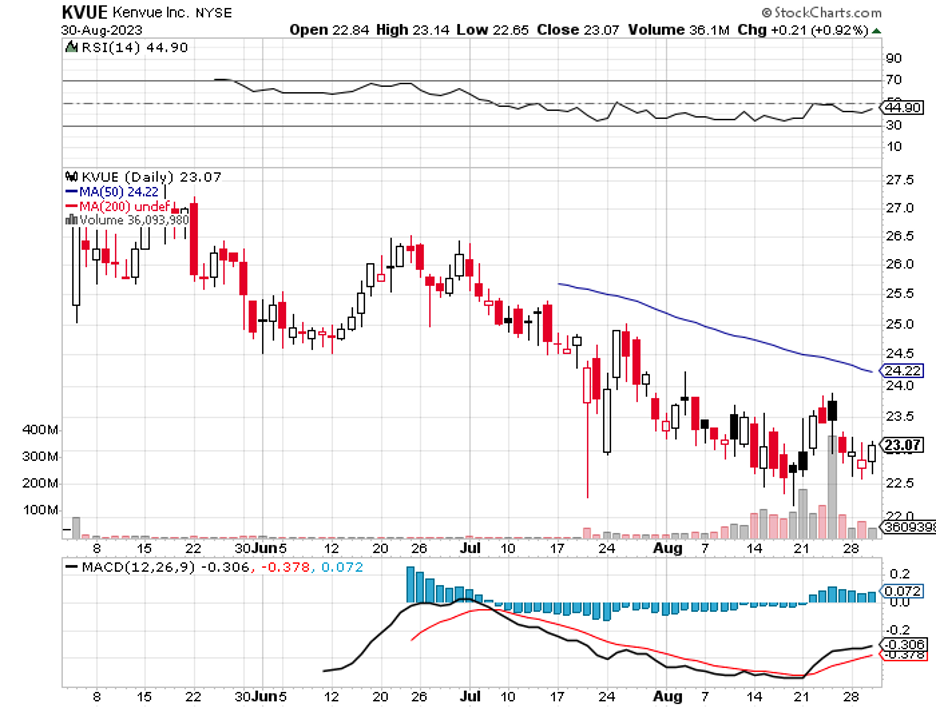A 'Fresh Face' in the Dividend Aristocrats Index
The S&P 500 Dividend Aristocrats Index has recently added a significant name to its ranks: Kenvue (KVUE).
Though referring to Kenvue as a 'newcomer' might seem paradoxical, given its impressive roster of iconic brands such as Tylenol and Band-Aid. This company has a remarkable 135-year history to its credit.
Brought to the market through a strategic spinout by Johnson & Johnson (JNJ), Kenvue debuted on the NYSE this past May, proudly showcasing a market capitalization nearing $79 billion. This masterstroke funneled a substantial $13.2 billion into JNJ's reservoir, an outcome of both debt offerings and the subsequent IPO.
The move emphasizes the strategic rationale behind the future plans of both companies: prioritizing agility, enhancing flexibility, and ensuring concentrated success.
It's then no coincidence that Kenvue soon found itself part of the portfolio of noteworthy ETFs such as ProShares S&P 500 Dividend Aristocrats (NOBL) and FT Cboe Vest S&P 500 Dividend Aristocrats (KNG). This recognition aligns with JNJ's established reputation as a dividend aristocrat.
A critical insight from S&P Global (SPGI), the guardian of this index, indicates an intriguing approach for the next two years: dividends from both parent JNJ and offspring Kenvue will be combined to determine their collective eligibility for this esteemed group. Post this period, while the specifics of S&P’s plan remain under wraps, indicators point towards Kenvue maintaining its prestigious position, especially if its revenue trajectory remains positive.
Meanwhile, Kenvue announced a promising 20-cent per share dividend as its introduction. Meanwhile, with JNJ's anticipated $1.11 quarterly payout and a bullish forecast for its 2024 free cash flow pegged at an impressive $26 billion, the emphasis on consistent, growing dividends is clear. JNJ's recent dividend of $1.19 per share, reflecting its progressive trend, further cements this.
Moreover, Kenvue's current dividend yield stands at 3.5%, impressively outperforming the average aristocrat yield of 2.5%.
In the valuation spectrum, Kenvue's shares are positioned at 17.9 times the projected 2024 earnings. While some might express skepticism over its valuation due to its newcomer status, Kenvue's robust financials and upward cash flow trajectory suggest a poised path for significant growth in the future.
Looking into its trajectory, it’s safe to say that the stock is reasonably priced. However, a thorough analysis mandates acknowledging potential headwinds.
Consider the challenges posed by an exceptionally strong 2022 cold and flu season. Moreover, we can't ignore the looming legal complications tied to talcum powder disputes.
A sigh of relief, though, is that the brunt of these talc-related litigations rests with JNJ, evident from its near-$9 billion settlement in April. Thus, concerns over Kenvue's liquidity and cash flow might be somewhat overblown.
JNJ's recent financial projections indicate an optimistic 12.5% growth in its 2023 adjusted earnings per share, year-on-year. They've also strategically classified their consumer health segment as "discontinued operations," anticipating a robust $20 billion boost in Q3, courtesy of the spinoff.
Evidently, this stock isn't just turning heads because of its dividend - though that's certainly a feather in its cap.
With a stable and progressively growing income stream, Kenvue stands resilient against economic headwinds and the erratic dance of market volatility. In the vast sea of the consumer healthcare industry, Kenvue is sailing strong. The currents are in its favor: an aging global population and a swelling demand for self-care products are the tailwinds pushing it forward.
To sum it up, Kenvue is presenting an intriguing cocktail of value, consistent income, and potential growth. For those with an eye on both income and value, Kenvue should certainly be on the radar.

